The Ultimate Guide To Geotheta
Table of ContentsThe 25-Second Trick For GeothetaAn Unbiased View of GeothetaThe Only Guide for GeothetaRumored Buzz on Geotheta
They collaborate with civil engineers, structural engineers, engineers, and various other specialists to incorporate geotechnical factors to consider right into the general project style and building and construction procedure. This needs efficient team effort, coordination, and interaction to ensure that the geotechnical elements align with the project purposes and fulfill governing demands.Mining & Materials Engineering: Principles of boring, infiltration rates, and elements affecting the option of drilling approach. Characteristics of explosives, shooting systems and blast patterns. Blasting techniques in surface area and underground operations. Special blowing up methods at excavation borders. Vibration and noise control. Mechanical and constant methods to fragmentation, consisting of longwall shearing and fullface boring.
Integrated analysis of fragmentation and comminution operations. Provided by: Mining & Materials Engineering.
How Geotheta can Save You Time, Stress, and Money.
Bachelor's degree programs in civil, geotechnical, geological, and environmental design normally last four years and include basic education and learning programs in English, social scientific research, and the humanities, along with training courses in sophisticated mathematics, structural geology, and liquid mineralogy. (https://triberr.com/geotheta)
Geotechnical design entails the evaluation of the dirt and rock conditions at a specific website, and their ramifications for the growth of that website. As a lot of structures depend on the ground for support, it is without shock that a thorough understanding of the ground problems, and the suitability of structure systems, are important to the long-term stability and efficiency of the building or structure.
Specialising in the examination of geological developments and ground practices, geotechnical designers execute scientific investigations and testing to comprehend the impact these geological developments might have on the design and building of building, civil and framework tasks. This knowledge is important for the style and building of buildings, roadways, passages, dams, bridges, and supply of water and sewer systems.
The geotechnical group at Douglas Allies routinely seek advice from architects, design engineers, developers, and builders to make suggestions on style and advancement propositions to ensure that the constructed structures are suitably developed for the ground conditions. The style of footing systems needs to take into consideration the weight of the structure, the ability of the ground to support that weight with each other with activity resistances and effective building and construction.
The Basic Principles Of Geotheta
This task is significantly simplified by the use our Douglas Map geospatial platform that makes this information conveniently accessible in an easy to use internet browser user interface. A geotechnical engineer will certainly guide the exploration of boreholes and test pits to collect dirt and other examples, and additionally evaluate surface features and ground exposures to create a geotechnical design of the subsurface problems.
Depending on the task kind and ground conditions encountered, research laboratory screening may among other points assess stamina, compressibility, sensitivity and/or leaks in the structure of dirt and rock examples. Hereafter information is gathered and collated, the results are made use of for a geotechnical model of the website, which is usually offered as sections throughout the website.

A geotechnical examination naturally can just assess the ground conditions at the areas drilled or dug deep into. All-natural variations in dirt and rock conditions can occur throughout a website and in between examination places. It is consequently excellent technique that the geotechnical engineer be kept throughout building and construction of the project to supply on-site confirmation that the ground conditions encountered are consistent with the assumptions and suggestions provided in the geotechnical examination report.
All about Geotheta
Geotechnical engineers utilize their in-depth expertise of dirt and rock to assess danger and solve problems on diverse infrastructure projectsGeotechnical design is a specialist branch of civil design which considers the practices of planet materials and the application of soil and rock mechanics. Consulting Engineers. As a geotechnical engineer, you will examine the physical, mechanical and chemical homes of soil and rock in order to design structures, keeping structures and earthworks
Geotechnical engineering is closely connected to and overlaps with, both engineering geology and ground engineering - https://penzu.com/p/952dfde2dba9ee4f. It's possible to specialise in geotechnics or work for a geotechnical firm but be understood as a design geologist or a ground engineer. As a geotechnical engineer, you'll require to: develop and keep connections with customers and various other professionals involved in the site, throughout each projectmaintain security criteria on site be mindful of cost implications when you make recommendationsstudy geological maps and airborne pictures from an array of sources and from different time periodsexamine construction plans to see just how feasible they are based upon your understanding of the siteinvestigate threats or geological risks for the sitesearch for ecologically delicate attributes, such as landfill start to develop accurate and interpretive ground modelsplan field investigationsdrill and evaluate samples of bedrock, dirt, groundwater and extra products supervise various other specialists on sitesolve technological issues as they develop, such as unanticipated frameworks at drill sitesmonitor conditions throughout and after building and construction to make certain frameworks are steady in the brief and long termadding information gathered on website to your initial researchcreating geotechnical computations, drawings, and two or three-dimensional computer system models analyzing the datamaking recommendations regarding the suggested use of the site
